Respect for good clinical practice already contributes towards reducing transmission of these diseases.

Newcastle disease / highly pathogenic avian influenza
(high mortality and/or major nervous disorders and/or other warning clinicalsigns)
Call a member of staff who will take the appropriate steps
Do not take even the smallest piece of equipment out of the room
Disinfect the soles of your shoes
Wash all your own clothing
Avoid any contact with other birds for the next six days.

Rabbit haemorrhagic disease (RHD) / myxomatosis
Avoid any contact with susceptible animals before having disinfected the soles of your shoes and changed (washed) your own clothing

Chlamydophilosis
Because this disease is still very frequent in psittacidae, and unless there is formal proof that the animal in front of you is not infected, gloves and protecting glasses should be worn during consultations with these animals.
Avoid any contact with susceptible animals before having disinfected the soles of your shoes and changed (washed) your own clothing.
In case of serious doubt, a mask should be worn.
If flu-like symptoms develop within one to three weeks after having examined a suspect bird, students must consult their regular doctor and inform him of the possibility that she/he is suffering from psittacosis.

Call a member of staff
In case of other diseases for which the slightest doubt exists, call a member of staff

Wash your hands
After any suspicion of contamination, it is compulsory to wash your hands and dry them with single use paper, before disinfecting them with the product provided.